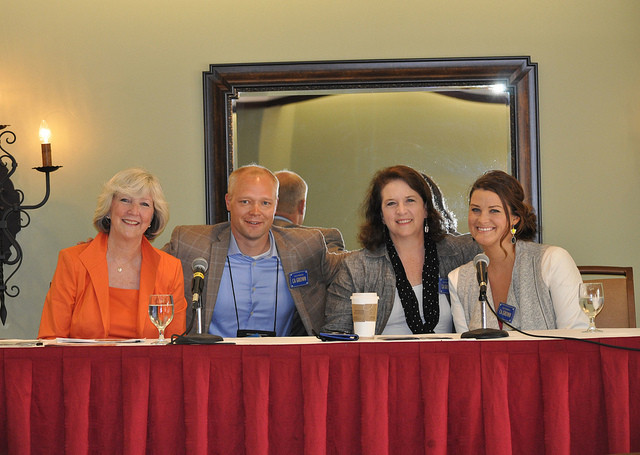Podcast: Play in new window | Download
Subscribe: Apple Podcasts | Podcast Index | RSS | More
Welcome to Episode 101 of the new SLOW FLOWERS Podcast. The audio featured here is from the July 19, 2013 panel discussion at the California Association of Flower Growers & Shippers (NORCAL) conference, moderated by Kasey Cronquist, CEO/Ambassador of the California Cut Flower Commission. Panelists included Kathy Brenzel, garden editor at Sunset Magazine; Christina Stembel, founder of Farmgirl Flowers, and me. The audience Q&A that followed our presentation was difficult to hear due to the limited number of microphones in the room, so here is the edited transcript of those questions and our panel’s answers.
Q&A following Field-to-Vase Panel discussion:
Kasey Cronquist : I hope you all have a sense of how special this group is in context of this industry. This is certainly a trend, or as Debra says, “a cultural shift,” that we’re excited about. It’s a special time because you’re not necessarily going to hear a program like this or have the chance to hear from speakers like this subject in our industry or at other floral trade conventions. I get to sit back and enjoy listening to people talk about locally-grown.
I think you have a sense here that there’s a renaissance in our midst in terms of bringing flower farmers back and of course this is a good thing for California. Where people say “California’s Flowers are America’s Flowers,” it’s because we want to back up that local claim for those florists when the season is over and they can’t source from those local farmers, California’s growing flowers all year long providing another source of American grown. I could spend each day energized by the things I’ve heard here. I want to open it up to questions:
Q: Regarding the “Farm-to-Consumer” idea or for that matter, “Farm-to-Florist.” How should our wholesalers in the room feel about this particular approach? Because I can certainly see where you’re going. We are flower growers who are strictly wholesale and we want to keep it that way. I have 185 customers and I don’t want 2,000 so how does that work for the wholesaler?
A (Debra): I totally agree that we’ve got to work on the wholesale level of this message. Maybe I’m naive, but I don’t think wholesalers should be afraid of this concept at all. They’re the ones who are on the front lines, talking to florists. And even if you don’t care about American grown, you should care about making money and branding your flowers as American grown or California grown in order to answer the question that the florists are going to be asking anyway. If they’re not asking it now, they’re very soon going to be asking it because consumers are asking them. I think from a farmer point of view if you can provide content, photography, messaging or signage that the wholesalers can use it’s going to do the work for them. I know there’s a fear that somehow the florists are going to cut around the wholesaler and come to you direct, but like you just said, you don’t want to deal with all those florists. So if you can partner with the wholesaler and make everybody succeed, I think it could be a win-win.
A (Christina): Pictures. Pictures of the farmers with content about where (the flowers) come from. People want to see a human face, so give them information about “this is the farmer who grew this.” It’s something that the wholesalers can then give to their customers. At Farmgirl Flowers, we use a wholesaler as well for some of our product and they don’t want to be photographed because they don’t want 2,000 people coming to them either. But it’s about educating the florist. And I really do see this movement shifting quickly and I think that the florists will be asking you soon, just based on the volume of questions we get. We’ve had to hire staff people just to answer the email and the phone calls that we get from florists. It’s not directly our bread and butter but we feel like it’s our mission to educate as well.
Kasey Cronquist: I want to add to that. We’ve felt that pressure on the requests for content. For wholesalers, as much as for the flowers, it’s a content marketing-supply opportunity for them. They have the relationships with the farms and they can package that relationship up and provide it to the florists who are wanting that content to share, either on Facebook or Pinterest so (the florist) has access to the farmer, not directly, but through the wholesaler’s relationship with the farmer.
READ MORE…









